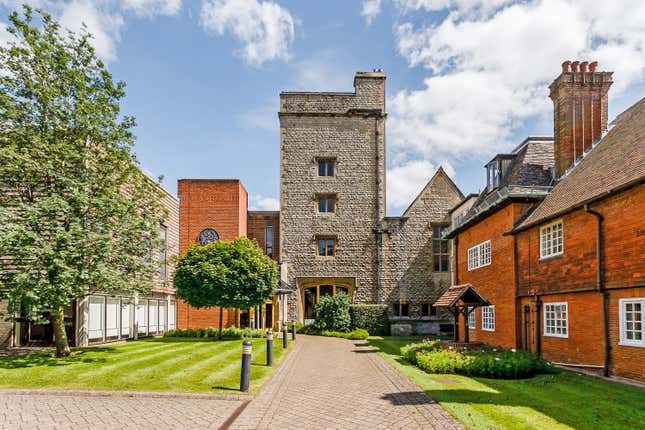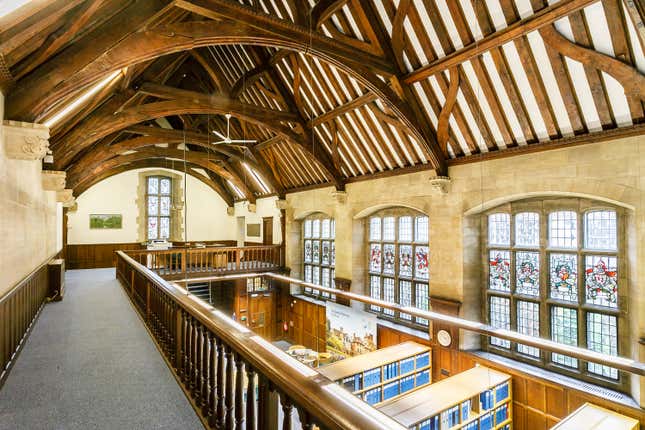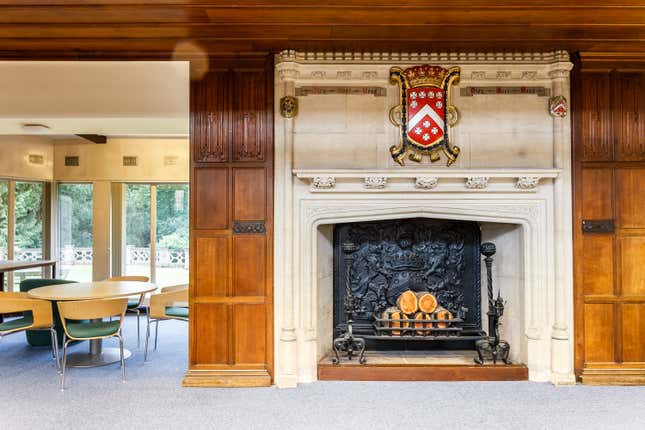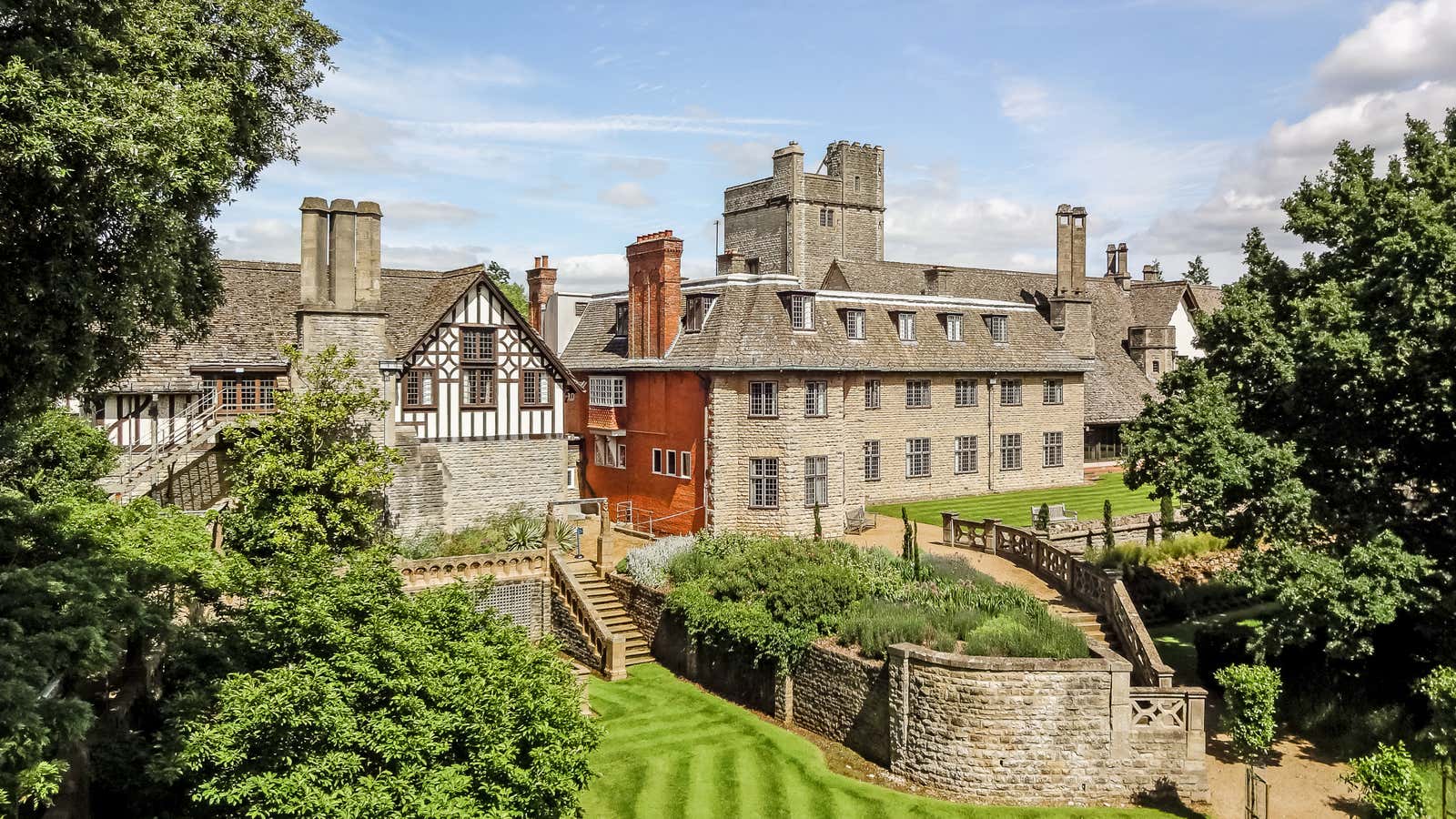Tudor-style beams, red brick, a private lake and well-mowed quads—these are the architectural trappings of the next campus for one of China’s top universities.
Peking University, often ranked as China’s top university, will soon welcome students to Foxcombe Hall, a 15-acre (6.15 hectare) estate located about 3 miles from Oxford University. The university has purchased the late 19th-century manor in Oxford, UK, as the overseas site for its HSBC Business School, a Shenzhen-based offshoot of Peking University’s main campus in Beijing. (The new business school, which is partially funded by the bank, has no connections with Oxford University, apart from geographic proximity.)
Peking University can take possession of most of the estate from May, according to the real estate agents for the manor. (See a video of Foxcombe Hall.)
According to Chinese media outlet Caixin, the Oxford campus will offer a two-year master’s program serving both Chinese and non-Chinese students. For Chinese students, particularly, the campus may offer the dual attraction of studying abroad in a Hogwarts-like setting, while remaining in a familiar cultural environment. It’s not clear how much tuition will cost. Peking University’s HSBC Business School in Shenzhen charges 60,000 yuan ($8,685) annually for a two-year master’s degree program and 90,000 yuan (about $13,600) annually for a two-year MBA. Representatives at Peking University did not respond to Quartz’s inquiries about class make-up and curricula.

The site’s history spans over a century. In 1893 it was acquired by Lord Randall Berkeley (also know as the 8th Earl of Berkeley), a renowned scientist who researched the physical chemistry of crystals in a lab he built at the site (registration required). Berkeley was also an avid golfer and, according to his obituary, built a nine-hole course on the premises—something China’s business elites might have mixed feelings about. In the mid-1930s the site was acquired by Ripon Hall, a theological college.
In 1975 it was then purchased by the Open University—an institution in its own right. As the UK’s largest public university, it serves 170,000 students, the majority of whom enroll for continuing education courses completed remotely.
OU has hit hard times recently, though. Increases in tuition fees, coupled with competition from online course programs like Coursera, have caused enrollment to dwindle. In 2015, in anticipation of these trends continuing, the university announced it would close seven of its nine campuses, including the one in Oxford. It was put up for sale in September 2016. Peking University purchased the property for £8.8 (about $11 million).


The historic ground’s acquisition by Peking University takes place as Chinese students and real estate money flow abroad, while the Chinese Communist Party continues to exert influence over academia. Chinese investors have steadily been purchasing property in the UK, and unlike buyers from other countries, they show no signs of slowing down post-Brexit.
Meanwhile, domestic Chinese students are studying abroad in droves. The number of overseas Chinese students hit over 300,000 in 2014, marking a five-fold increase since 2000. Mainland Chinese students now make up an overwhelming majority of foreign students studying in UK universities.
Peking University’s expansion to England, a first for a Chinese university, marks a twist in an existing trend in academia. For years, prestigious colleges from the US and UK have established satellite campuses in the Middle East and China, while schools in emerging economies lacked the global recognition to go the other way.
Not that the efforts of Western universities to head east have come without controversy. The president of New York University, who oversaw the university’s expansion into Shanghai via a joint venture with East China Normal University, has spoken frankly about how the concepts of academic freedom central to US liberal arts institutions don’t necessary apply (paywall) at their Chinese campuses. So has a Chinese board member at Duke University, which has been in China since 2012 through a similar partnership,
All the while, academia at large in China remains stressed under president Xi Jinping. The president has called for all universities to “adhere to correct political orientation,” in effect signaling that promoting ideals that counter those held by the party could cause professors to lose their jobs.
It’s not clear if similar constraints on academic freedom will apply when Chinese institutions like Peking University expand overseas. Clay Shirky, a professor at NYU Shanghai, is pessimistic. “It means Beijing is confident they can now export censorship, localized to college campuses and student devices, without facing significant technical or political opposition from the UK,” he says.
Given the program’s focus on business, it’s possible such anxieties will remain marginal among the faculty and target student population. But with public universities in the US and UK struggling financially, and the prospect of continued Chinese investment overseas, expect these concerns to grow more common, not less.
